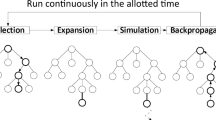Abstract
Game Logic is a modal logic which extends Propositional Dynamic Logic by generalising its semantics and adding a new operator to the language. The logic can be used to reason about determined 2-player games. We present an overview of meta-theoretic results regarding this logic, also covering the algebraic version of the logic known as Game Algebra.
Similar content being viewed by others
References
Back, R.-J., and J. Von Wright, Refinement Calculus - A systematic introduction, Springer, 1998.
Baeten, J., and W. Weijland, Process Algebra, Cambridge University Press, 1990.
Berwanger, D., ‘Game Logic is Strong Enough for Parity Games’, Studia Logica, 75(2):205-219, 2003.
Van Benthem, J., Modal Correspondence Theory, PhD thesis, University of Amsterdam, 1976.
Van Benthem, J., ‘Program constructions that are safe for bisimulation’, Studia Logica, 60(2):311-330, 1998.
Van Benthem, J., ‘Logic games are complete for game logics’, Studia Logica, 75(2):183-203, 2003.
Van Benthem, J., Logic in Games, Lecture notes, unpublished.
Blackburn, P., M. De Rijke, and Y. Venema, Modal Logic, Cambridge University Press, 2001.
Bradfield, J., and C. Stirling, ‘Modal logics and mu-calculi: an introduction’, in J. Bergstra, A. Ponse, and S. Smolka, (eds.), Handbook of Process Algebra, Elsevier, 2001.
Brams, S., and A. Taylor, Fair Division: From Cake-cutting to Dispute Resolution, Cambridge University Press, 1996.
Chellas, B., Modal Logic - An Introduction, Cambridge University Press, 1980.
Fokkink, W., Introduction to Process Algebra, Springer, 2000.
Goranko, V., ‘The Basic Algebra of Game Equivalences’, Studia Logica, 75(2):221-238, 2003.
Harel, D., ‘Dynamic logic’, in D. Gabbay and F. Guenthner, (eds.), Handbook of Philosophical Logic, volume II, Kluwer, 1984.
Harel, D., D. Kozen, and J. Tiuryn, Dynamic Logic, MIT Press, 2000.
Kozen, D., ‘Results on the propositional μ-calculus’, Theoretical Computer Science, 27:333-354, 1983.
Parikh, R., ‘Propositional logics of programs: New directions’, in M. Karpinski, (ed.), Foundations of Computation Theory, LNCS 158, pp. 347-359, Springer, 1983.
Parikh, R., ‘The logic of games and its applications’, in M. Karpinski and J. van Leeuwen, (eds.), Topics in the Theory of Computation, Annals of Discrete Mathematics 24, Elsevier, 1985.
Pauly, M., ‘From programs to games: Invariance and safety for bisimulation’, in P. Clote and H. Schwichtenberg, (eds.), Computer Science Logic, LNCS 1862, Springer, 2000.
Pauly, M., ‘Game logic for game theorists’, Report INS-R0017, CWI, 2000.
Pauly, M., ‘An introduction to game logic’, in M. Faller, S. Kaufmann, and M. Pauly, (eds.), Formalizing the Dynamics of Information, CSLI, 2000.
Pauly, M., Logic for Social Software, PhD thesis, University of Amsterdam, 2001.
Venema, Y., ‘Representing Game Algebras’, Studia Logica, 75(2):239-256, 2003.
Author information
Authors and Affiliations
Rights and permissions
About this article
Cite this article
Pauly, M., Parikh, R. Game Logic - An Overview. Studia Logica 75, 165–182 (2003). https://doi.org/10.1023/A:1027354826364
Issue Date:
DOI: https://doi.org/10.1023/A:1027354826364




